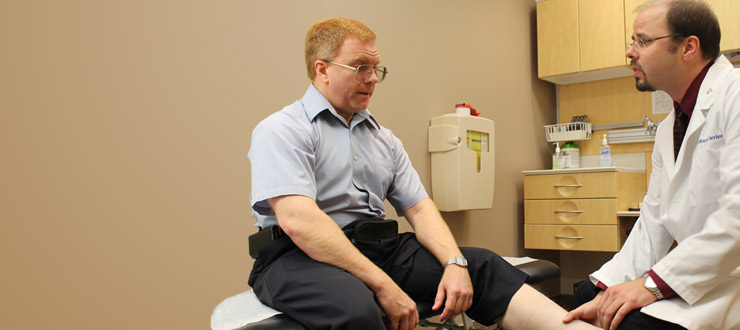
“I’m glad that I could contribute to research that will help patients and save the health-care system money,” said Jamie Dossett-Mercer (left), who was treated by Dr. Marc Carrier.
It came on intermittently over a few weeks. One day Jamie Dossett-Mercer had just completed his daily fitness routine and was back at his desk, when he noticed his left leg was swollen, again. Imaging tests ordered by his family doctor revealed the silent foe.
“I knew that something was not right. My leg was ballooning, on and off. So, following the tests, I was told to head to The Ottawa Hospital emergency room immediately,” said Dossett-Mercer. “They were quick to admit me.”
Dossett-Mercer was seen by Dr. Marc Carrier, a hematologist and scientist with The Ottawa Hospital and professor with the University of Ottawa. Dr. Carrier began treatment for major blood clots in the veins of the left leg. If one of those clots had broken off, it could have travelled to a lung and caused a pulmonary embolism – often fatal.
About 60,000 Canadians are diagnosed each year with blood clots in the lungs and legs (called venous thromboembolism). In some cases, the clots are caused by trauma, surgery, prolonged immobility or a known cancer. In about half of cases, the cause of the clots is unknown.
In Dossett-Mercer’s case, the cause is still unknown.
The condition led to Dossett-Mercer’s involvement in a ground-breaking clinical trial, with results published in the New England Journal of Medicine.
“Unexplained blood clots have long been thought of as a possible early warning sign of cancer,” explained Dr. Carrier. “Some clinical guidelines recommend a CT scan of the abdomen and pelvis, in addition to other cancer screening. But there’s little evidence to show that this CT scan is helpful. We did this study to find out.”
What Dr. Carrier and his research team, along with patient volunteers like Dossett-Mercer, proved is that CT scans in patients with unexplained blood clots are unnecessary and can do more harm than good. The study showed there was no difference in the number of new cancers detected through the use of CT scans and also no difference in the number of cancer-associated deaths.
“Unnecessary CT scanning can cause stress and anxiety in patients, as well as radiation exposure, and it can lead to over-investigation of false-positive findings,” explained Dr. Carrier. “Our study means many patients will now be able to avoid this.”
The results could also lead to more than $9 million in savings for Canada’s health-care system.
As testimony to the importance of this research, Dr. Carrier has been selected as the 2015 Dr. Michel Chrétien Researcher of the Year by the Ottawa Hospital Research Institute Awards Committee. He will receive the award on Nov. 21 at The Ottawa Hospital Gala.
For more information, please listen to this television interview with Dr. Carrier and Jamie Dossett-Mercer.

Support patient care and research at
The Ottawa Hospital


 To reset, hold the Ctrl key, then press 0.
To reset, hold the Ctrl key, then press 0.